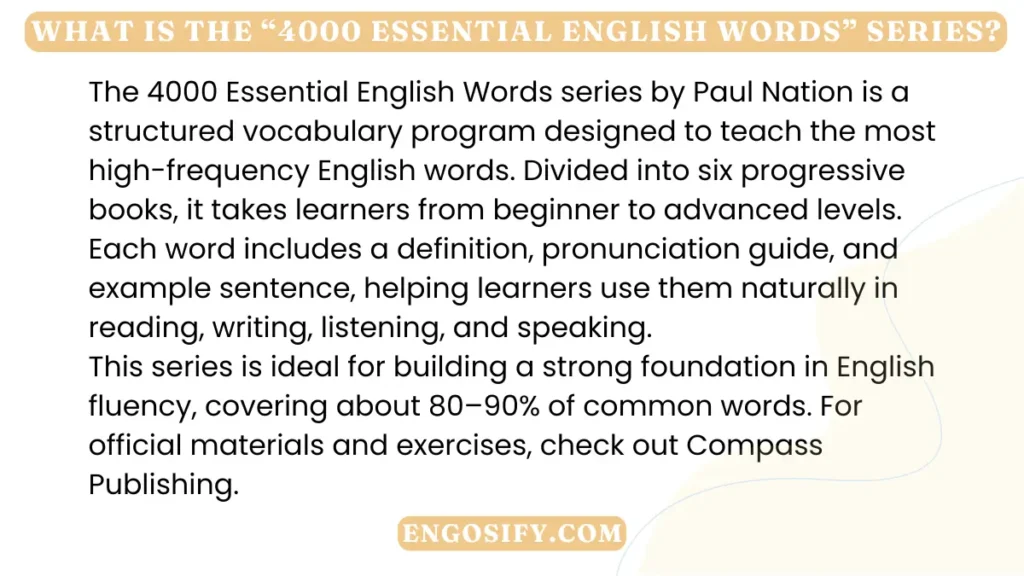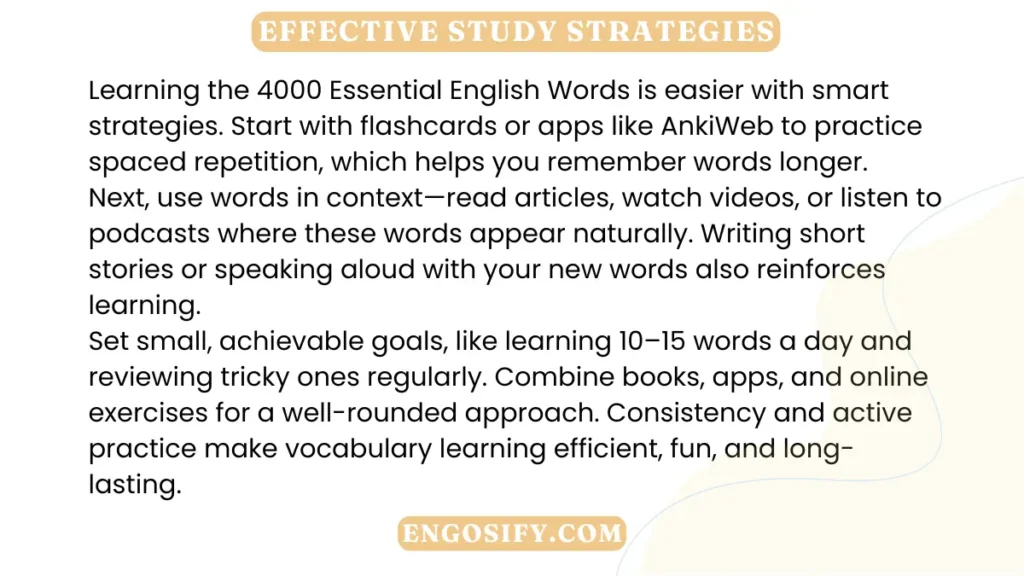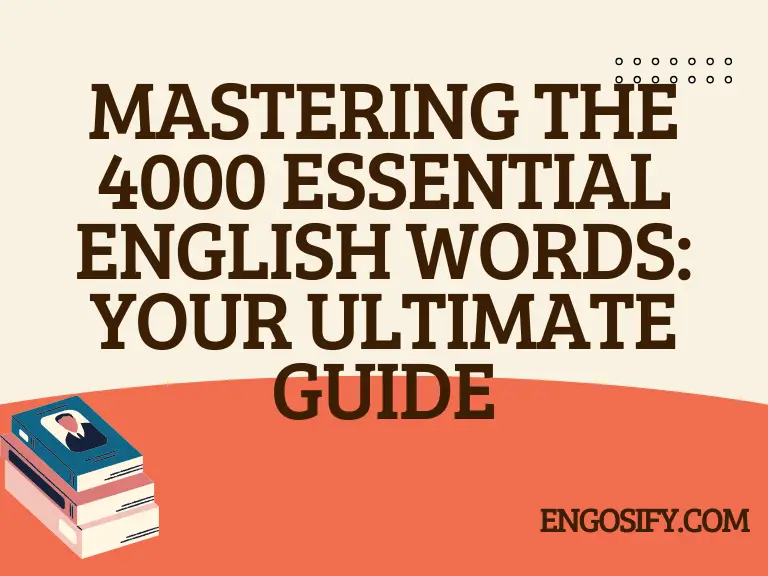Learning English vocabulary can feel like climbing a mountain sometimes, right? But imagine if you had a map, a clear path that guides you step by step, making the journey easier and way more fun. That’s exactly what the 4000 Essential English Words series offers. From beginners to advanced learners, this series helps you master high-frequency words, improve comprehension, and boost your English fluency in real-life situations. In this article, we’ll dive deep into the structure, benefits, and best strategies for learning these words efficiently, so you can confidently use them in conversations, reading, writing, and even exams.
Introduction to the 4000 Essential English Words Series
What Is the “4000 Essential English Words” Series?
The 4000 Essential English Words series, created by the renowned linguist Paul Nation, is more than just a collection of words. It’s a carefully structured guide that introduces high-frequency vocabulary step by step. Designed for learners from high-beginner to advanced levels, each word is presented with clear definitions, example sentences, and sometimes even exercises to make sure it sticks. Unlike random word lists, this series emphasizes context, helping learners see exactly how words are used in everyday English.
What’s truly awesome is how the series breaks down the overwhelming task of learning thousands of words into manageable chunks. Each book focuses on around 600–1000 words, gradually building your vocabulary in a logical, structured way. By the time you finish all six books, you’ll have mastered words that cover around 80–90% of commonly used English in conversations and writing.
Why These Words Matter
You might wonder, “Why not just memorize random words?” Well, here’s the thing: not all words are created equal. The words in this series are high-frequency, meaning they appear over and over in books, newspapers, movies, and daily conversations. Learning them gives you a solid foundation, making it easier to understand spoken English, read articles without constantly reaching for a dictionary, and even write with confidence.
Plus, when you focus on practical vocabulary, you’re not just memorizing—you’re learning to think in English. That’s a game-changer for anyone aiming to improve language proficiency, whether for travel, work, or studies. For those curious, you can check out Compass Publishing for official materials and extra resources to complement your learning journey.

Structure and Content of the Series
Book Breakdown
The 4000 Essential English Words series is cleverly organized to take learners from simple to more complex vocabulary without overwhelming them. The six books are structured progressively:
- Book 1 focuses on the first 1000 words, perfect for high-beginners, covering words you’ll encounter almost every day.
- Books 2–4 each introduce around 600 words, gradually increasing in difficulty while reinforcing what you’ve already learned.
- Books 5–6 tackle advanced vocabulary, preparing learners for academic texts, professional communication, and even standardized English exams.
This logical progression ensures that you’re always building on a solid foundation. By the end of the series, you’ll have mastered essential English vocabulary that appears in real-life conversations, media, and textbooks.
Learning Methodology
What makes this series truly stand out is its context-based approach. Instead of dry definitions, each word comes with:
- A simple, clear definition that’s easy to understand
- Pronunciation tips so you can say words confidently
- Example sentences demonstrating real-world use
Even better, many books include exercises designed to help learners actively engage with the words. Repetition isn’t boring here—it’s strategic. By revisiting words in different contexts, your brain starts to retain them naturally. This approach taps into techniques like spaced repetition, which is known to dramatically boost long-term vocabulary retention.
For tech-savvy learners, digital flashcards and apps like AnkiWeb can complement your study routine, letting you practice words anytime, anywhere. The interactive element adds a little fun and keeps your brain engaged, which is essential when tackling thousands of words.
By understanding the series’ structure and methodology, you can create a personalized learning plan. For instance, you might choose to study a certain number of words per day, practice with flashcards in the evening, and then apply them in reading or writing exercises. This strategic approach ensures that your study time is efficient, productive, and enjoyable.
Benefits of Learning These Words
Real-World Application
Learning the 4000 Essential English Words isn’t just about memorizing lists—it’s about unlocking the ability to communicate effectively. Imagine watching a movie, reading a newspaper, or chatting with a friend without constantly pausing to figure out a word’s meaning. That’s the kind of confidence you gain when your vocabulary covers the most frequently used words in English.
These words appear everywhere—emails, articles, dialogues, even academic papers. Once you know them, comprehension becomes smoother, and your brain doesn’t have to work as hard to understand context. Plus, using these words naturally in speech and writing gives your English a polished, professional edge. It’s like having a toolkit: the more tools you have, the easier it is to handle any task.
Academic and Professional Advantages
The benefits don’t stop at casual conversation. A strong grasp of high-frequency words directly impacts performance in exams like TOEFL, IELTS, or Cambridge tests. Students often notice that reading passages become less intimidating, and writing assignments flow more smoothly.
Professionals, too, reap rewards. Whether you’re writing reports, participating in meetings, or presenting ideas, knowing these essential words lets you express yourself clearly and persuasively. And because these words are so common, you’re also better at understanding colleagues, clients, or international partners, which is invaluable in today’s global workplace.
Cognitive Benefits
Interestingly, mastering high-frequency vocabulary also improves your brain’s language processing speed. Your mind begins to recognize patterns, anticipate meanings, and make connections between words. Over time, this makes learning new words easier because you’re building on a strong foundation of essential English vocabulary.
In short, investing time in these words pays off across every aspect of language proficiency: speaking, reading, writing, and even thinking in English. And if you want to see how others successfully apply these strategies, Compass Publishing offers tips and exercises to boost retention and practical use.
Effective Study Strategies
Active Learning Techniques
Studying 4000 Essential English Words doesn’t have to feel like a chore. The trick is to engage your brain actively rather than just passively reading lists. One of the most effective methods is using flashcards. You can create your own or use apps like AnkiWeb, which leverage spaced repetition to help you remember words longer. By reviewing words at gradually increasing intervals, your memory retention skyrockets.
Another powerful strategy is to immerse yourself in context. Instead of memorizing isolated words, try reading articles, watching short videos, or listening to podcasts where these words appear naturally. Pause, note down unfamiliar words, and then see how they’re used in sentences. This not only reinforces meaning but also helps you learn proper pronunciation, collocations, and idiomatic usage.
Practice Makes Perfect
Don’t underestimate the power of writing and speaking exercises. Try writing short stories, diary entries, or essays using your newly learned words. Even better, speak out loud, record yourself, or practice with a language partner. This engages different parts of your brain and makes recall faster and more intuitive.
Setting Achievable Goals
Breaking your learning into small, achievable goals is key. For example, you might decide to learn 10–15 new words a day and review 20 words from previous lessons. Over time, these small daily efforts compound, and suddenly you’ve mastered hundreds of words without feeling overwhelmed.

Additionally, tracking your progress keeps you motivated. Mark words you’ve mastered, revisit the tricky ones, and celebrate milestones. You’ll be amazed at how a structured, consistent routine turns what once seemed impossible into something totally doable.
Combining Resources
Finally, don’t rely solely on one source. Use the books, digital flashcards, and online exercises in tandem. The combination of visual, auditory, and written practice ensures deeper learning. Tools like Compass Publishing provide exercises and example sentences that perfectly complement your study plan.
By mixing active learning, context-based practice, and goal-oriented study, you’ll maximize your retention, make learning enjoyable, and steadily build your English fluency.
FAQs
What is the 4000 Essential English Words series?
The 4000 Essential English Words series is a structured vocabulary program created by Paul Nation. It’s designed to help learners from beginner to advanced levels master high-frequency words that appear in daily conversations, reading materials, and professional settings. By learning these words, you gain a strong foundation in English fluency and comprehension.
How can I access the 4000 Essential English Words books?
You can find the books on platforms like Amazon, local bookstores, or online educational publishers. For official materials and exercises, Compass Publishing provides reliable resources that complement the books perfectly.
Are there digital versions or apps for this series?
Absolutely! Several apps, including Anki-based flashcard systems, allow learners to study interactively. These tools often include quizzes, spaced repetition, and practice exercises, making it easier to retain and recall words efficiently. Using apps alongside the books enhances learning and keeps your study routine dynamic.
How do I effectively study these words?
The best approach combines active learning, contextual practice, and regular review. Use flashcards, read articles or watch videos containing the words, and practice writing or speaking them daily. Breaking study sessions into smaller, manageable chunks and revisiting difficult words ensures long-term retention and language proficiency.
How long will it take to master all 4000 words?
The timeline varies depending on your study pace, consistency, and previous English knowledge. On average, studying 10–15 words per day with regular review can help you cover all 4000 words in roughly 8–12 months. The key is consistency—small, steady steps yield huge results over time.
Are these words useful for exams and professional life?
Yes! These high-frequency words are common in TOEFL, IELTS, Cambridge tests, academic texts, and workplace communication. Learning them improves comprehension, reading speed, writing clarity, and overall confidence in professional and academic contexts.
Conclusion
Mastering the 4000 Essential English Words is more than just memorizing a list—it’s about building a solid foundation for English fluency that opens doors to reading, speaking, writing, and professional success. By following a structured approach, using context-based learning, and incorporating tools like flashcards or apps such as AnkiWeb, you can make vocabulary learning both effective and enjoyable.
Whether you’re preparing for exams, aiming to improve daily communication, or simply want to think in English without hesitation, this series equips you with the words that matter most. Remember, consistency, active practice, and strategic study habits are your best allies. Start small, track your progress, and celebrate milestones along the way—before you know it, you’ll have unlocked a powerful vocabulary that gives you confidence and fluency in every English-speaking context.

